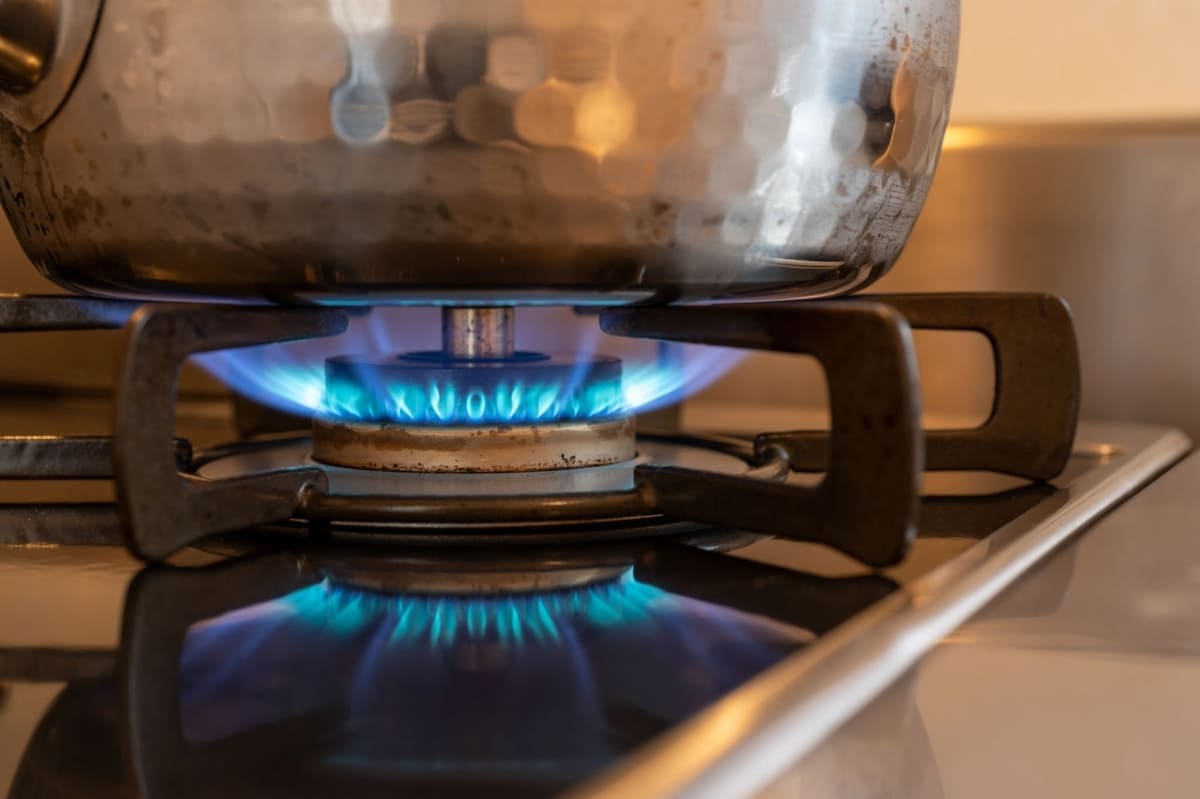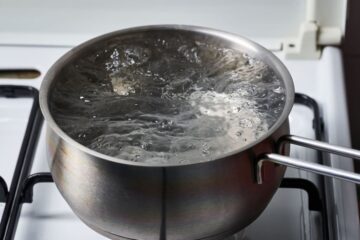Converting your natural gas stove to propane can be a cost-effective way to enjoy the benefits of both fuel sources. But what is the cost of such a conversion, and how do you calculate it? This blog post will answer those questions and provide a detailed guide on calculating the cost to convert a natural gas stove to propane .
Whether you’re a homeowner, a contractor, or a DIY enthusiast, this information will help you make an informed decision and budget accordingly. So, please sit back, relax, and dive into the cost calculation world for converting a natural gas stove to propane.
What’s The Difference Between Natural Gas And Propane?
Natural gas and propane are fossil fuels used for heating, cooking, and generating electricity. The main difference is the way they are stored and transported. Natural gas is typically piped directly to homes and businesses, while propane is stored in tanks and must be delivered.
Propane also has a higher energy density than natural gas, which means that it contains more potential energy per unit of volume. Propane is also more readily portable and can be used in areas where natural gas is unavailable, making it a popular choice for off-grid or rural locations.
What Is The Cost To Convert A Natural Gas Stove To Propane?
Cost To Convert Propane To Natural Gas:
Converting a gas stove from natural gas to propane (or vice versa) typically involves replacing key components to ensure safe and proper operation. The process usually requires the following:
Pressure regulator
This component controls the pressure of the gas supply, and the correct pressure is different for natural gas and propane. A new pressure regulator must be installed to match the new gas type.
Orifices
The orifices’ size and shape determine the gas flow rate to the burners. These must be replaced with the appropriate orifices for the new gas type.
Air mixer
In some cases, the air mixer (which controls the air-to-gas mixture for combustion) must be replaced or adjusted for the new gas type.
“The cost to convert a natural gas stove to propane can vary greatly based on several factors such as the location, the type of stove, the complexity of the conversion process, and the labor cost.
A basic conversion from natural gas to propane can range from $500 to $1,500. A more complex conversion process can cost upwards of $3,500 or more. The cost will also depend on the type of stove, with high-end models being more expensive to convert.
Additionally, the location of the stove and the availability of a propane gas line will also affect the conversion cost. If a propane gas line needs to be installed, the cost can be significantly higher.
It is important to note that converting a stove from one type of gas to another is a complex process that should only be performed by a licensed professional. Attempting to do it yourself could result in serious safety hazards and damage to the stove.”
How Long Does The Conversion Process Usually Take?
The conversion process from natural gas to propane usually takes a few hours to a full day, depending on the type of stove and the complexity of the conversion. A basic conversion for a standard stove can take anywhere from 2 to 4 hours, while a more complex conversion process can take upwards of 8 hours or more.
It is important to note that the conversion process involves changing the fittings and connections and ensuring that the stove is properly adjusted to run on propane gas. This includes adjusting the flame height, pressure, and air/gas mixture, which can take time to ensure a safe and efficient operation.
What Are Some Of The Factors That Can Affect The Cost?
Several factors can affect the cost of converting a natural gas stove to propane:
Type of stove
The cost to convert a stove can vary greatly depending on the type of stove and its complexity. High-end models will be more expensive to convert compared to standard stoves.
Availability of a propane gas line
If a propane gas line needs to be installed, this can greatly increase the conversion cost.
Labor cost
The cost of labor will vary depending on the location and the availability of a licensed professional.
The complexity of the conversion process
The more complex the conversion process, the higher the cost.
Materials and parts
The cost of the necessary materials and parts will vary depending on the type of stove and the complexity of the conversion process.
Location
The conversion cost can vary greatly depending on the location, with prices being higher in urban areas compared to rural areas.
Pros And Cons Of Converting A Natural Gas Stove To Propane.
Pros:
More Availability
Propane is widely available in many areas and can be stored in tanks on the property, making it a more accessible option than natural gas, which may not be available in certain locations.
Cost-effective
Propane is often cheaper than natural gas, which can result in lower energy bills.
Increased Efficiency
Propane stoves are known for their efficiency, which can result in faster cooking times and better heat distribution.
Portable
Propane stoves can be taken with you on camping or outdoor excursions, making them a more versatile option.
Cons:
Higher Initial Cost
Converting a stove from natural gas to propane can be more expensive, especially if a propane gas line needs to be installed.
Complex Process
A licensed professional should only perform the conversion process, adding to the cost and time required to complete the conversion.
Possible Performance Issues
If the stove is not properly adjusted for propane gas, it may not perform as efficiently as it would on natural gas.
Safety Concerns
Improper conversion can result in safety hazards such as gas leaks, which can be dangerous and even deadly.
How Much To Change Electric Stove To Gas?
Cost To Convert To Natural Gas From Electric:
The cost to convert from electric to natural gas depends on several factors, such as the type of heating system, the cost of natural gas in the area, the complexity of the conversion, and the cost of any necessary upgrades or modifications to the heating system.
On average, the cost can range from $125 to $2,000. It is always best to get a quote from a licensed HVAC contractor to determine the exact cost of a conversion.
How Much Does It Cost To Install A Gas Stove?
Are you worried about also How Much Does It Cost To Install A Gas Range? Installing a gas stove can cost anywhere from $250 to $300 on average, although the exact cost will depend on several factors. Some of these factors include the complexity of the installation, the cost of materials, and the location. For example, the installation cost may be higher if the gas stove requires additional plumbing or electrical work. Additionally, if the location is far from a natural gas line, running a new line may also add to the overall cost of installation.
In some areas, additional permits or inspection fees may also be charged, which can add to the overall cost. Some states require a licensed and insured professional to perform the installation, so it is important to check the local regulations before hiring someone to install your gas stove.
How Much Does It Cost To Install Propane?
The cost of installing a propane system depends on several factors, such as the size of the tank, the distance between the tank and the house, the type of appliances being powered, local labor rates, and other factors. It typically ranges from $2,000 to $5,000, but it can go higher for larger or more complex installations. Getting a quote from a licensed propane installation company is best to get an accurate cost estimate.
How Much To Install Gas Cooktop?
The price for setting up a gas stove top can differ based on elements such as the installation’s difficulty, the stovetop model, the local labor cost, and the price of necessary supplies. Installing a gas cooktop can range from $200 to $800. It’s best to get quotes from several licensed and insured professionals to compare costs and ensure a safe and quality installation.
Can A Gas Stove Be Converted To Propane?
Yes, a gas stove can be converted from natural gas to propane, and vice versa, by changing the burner orifices. The process usually requires adjusting the regulator pressure and ensuring the appliance is properly ventilated. It’s important to note that the conversion must be performed by a licensed professional, as incorrect conversion can be dangerous and may void the appliance’s warranty.
Before making any changes, consult the manufacturer’s instructions or consult with a licensed professional to determine the specific requirements and steps for converting your gas stove.
Should You Convert Your Natural Gas Stove?
The decision to convert a natural gas stove to propane or vice versa depends on the availability and accessibility of the different fuels in your area and your personal preference and needs.
If natural gas is unavailable in your area, propane may be a better option. Propane is often stored in a tank on the property, making it a convenient choice for those who live in rural areas.
However, natural gas is available in your area. In that case, it may be a more cost-effective option, as natural gas prices are often lower than propane.
Ultimately, deciding to convert a gas stove should be based on carefully considering your circumstances and a consultation with a licensed professional.
What should you need for Converting A Natural Gas Stove To A Propane Stove?
To convert a natural gas stove to a propane stove, you will typically need the following items:
Propane orifices
These are small tubes that control gas flow to the burners and must be specific to propane use.
Propane regulator
This regulates the pressure of the propane gas supply.
Conversion kit
Some stove manufacturers provide conversion kits with the necessary orifices and propane regulators.
Tools
Basic hand tools, such as a screwdriver and adjustable wrench, may be required for the conversion.
Safety equipment: Goggles and gloves to protect your eyes and hands during the conversion process.
How To Convert A Natural Gas Stove To Propane?
Converting a natural gas stove to propane requires several steps. It should only be done by a licensed professional to ensure safety and compliance with local codes and regulations. The general steps to convert a natural gas stove to propane are:
Turn off the gas supply
Turn off the main gas supply to the stove to ensure safety.
Change the orifices
Replace the natural gas orifices with the correct size orifices for propane.
Adjust the regulator pressure
The pressure in the propane regulator must be adjusted to match the stove’s specifications for propane use.
Check for leaks
After the conversion, test the stove for any gas leaks and ensure it works properly.
Ventilation: Ensure that the stove is properly ventilated to prevent any buildup of hazardous gases.
How To Convert Natural Gas Heater To Propane?
Converting a natural gas heater to propane requires the following steps:
Check compatibility
Make sure the heater is designed for dual fuel use or can be converted to run-on propane.
Obtain a conversion kit
Purchase a propane conversion kit specific to the model of your heater from the manufacturer or a distributor.
Please turn off the gas supply
Turn off the natural gas supply to the heater and disconnect it from the gas line.
Install the conversion kit
Follow the instructions provided with the kit to install the propane regulator, control valve, and other necessary components.
Test for leaks
Turn on the propane supply and check for leaks using a soap and water solution.
Adjust the gas pressure
Use a manometer to adjust the gas pressure to the correct level specified by the manufacturer.
Light the pilot light
Light the pilot light and test the heater to ensure it operates properly on propane.
The Final Words
The bottom line is if you want to know the true cost of converting a natural gas stove to propane, several factors must be considered. Each element will affect the cost—your type of stove, your outlet, plumber costs, and the conversion kit cost.
Frequently Asked Questions
How Much Propane Does A Gas Stove Use?
A gas stove using propane typically uses 30 to 50 gallons per year and provides 91,500 BTUs per gallon per hour.
What is Burns Hotter Natural Gas Or Propane?
Propane burns hotter than natural gas, with a maximum flame temperature of 1,960°F compared to 1,400°F for natural gas. This makes propane a better choice for high-heat output applications, such as grilling and outdoor heating.
Is A Propane Conversion Worth It?
Yes, a propane conversion is worth it as it can save money on fuel costs and reduce carbon emissions. Additionally, propane is a more reliable fuel source in emergencies.
What Happens If You Use Propane On A Natural Gas Stove?
Using propane on a natural gas stove is not recommended, as the two gases have different pressure levels. Using propane on a stove designed for natural gas can lead to safety hazards and decreased efficiency. It is best to use the proper fuel source specified by the manufacturer for the safe and efficient operation of the stove.
What Are the 3 Disadvantages Of Propane?
Propane has three main disadvantages. Firstly, it can be expensive compared to other fuel sources, making it less accessible for some consumers. Secondly, it may only be readily available in some areas, especially rural ones. Lastly, propane is flammable and can be explosive if not handled properly, making it a safety hazard.
Is It Cheaper To Heat With Propane Or Natural Gas?
The cost of heating with propane or natural gas depends on several factors, including the cost of fuel in your area and the energy efficiency of your heating system. On average, propane tends to be more expensive than natural gas.
How Long Does 500 Gallons Of Propane Last For A Home?
500 gallons of propane can last at home for approximately 2-14 months, depending on usage and appliance efficiency.
How Long Will 100 Gallons Of Propane Last For Cooking?
100-gallon propane tank will last for 732 hours or 30.5 days.



